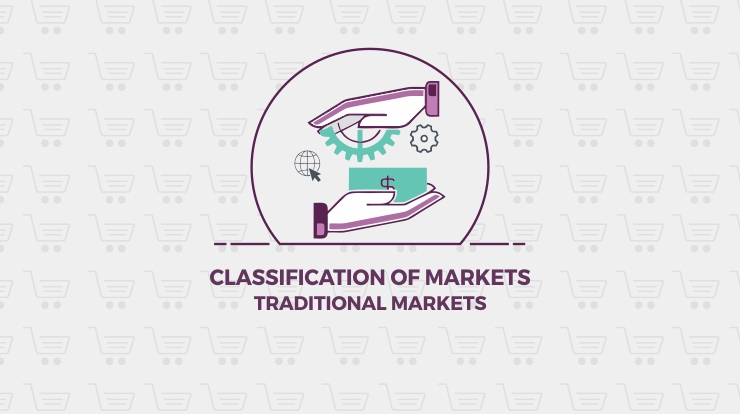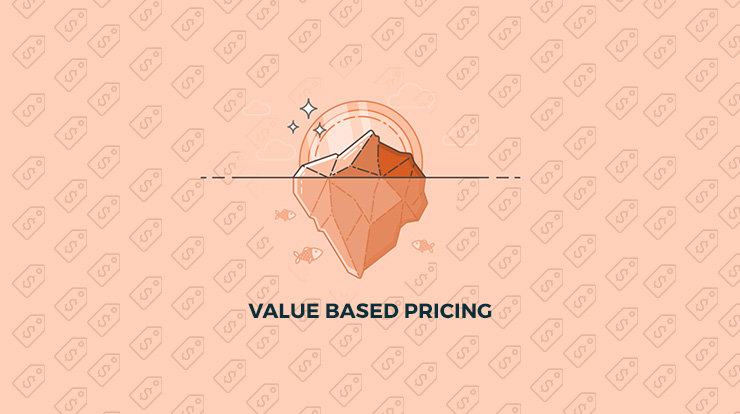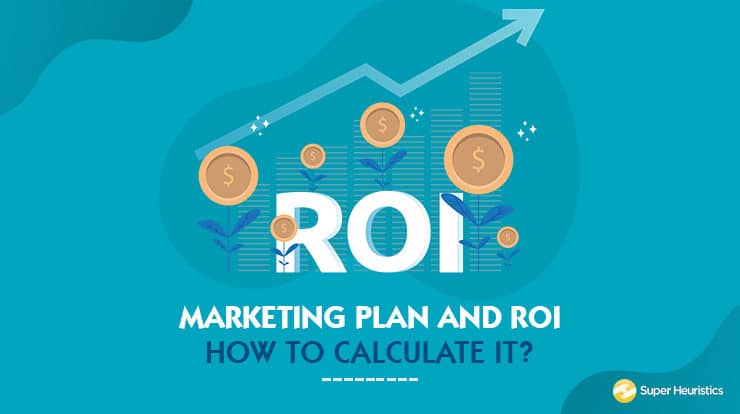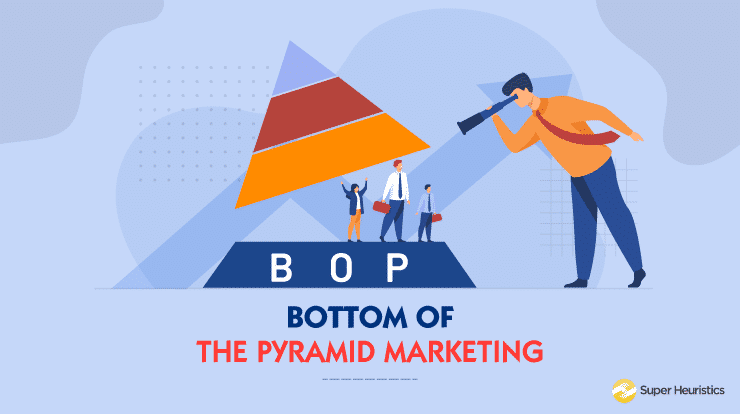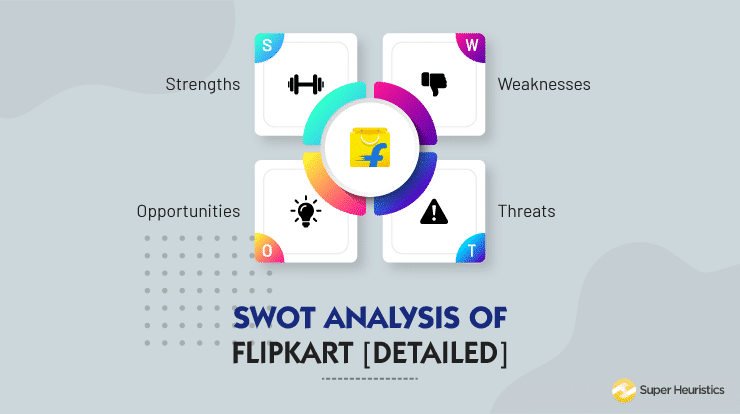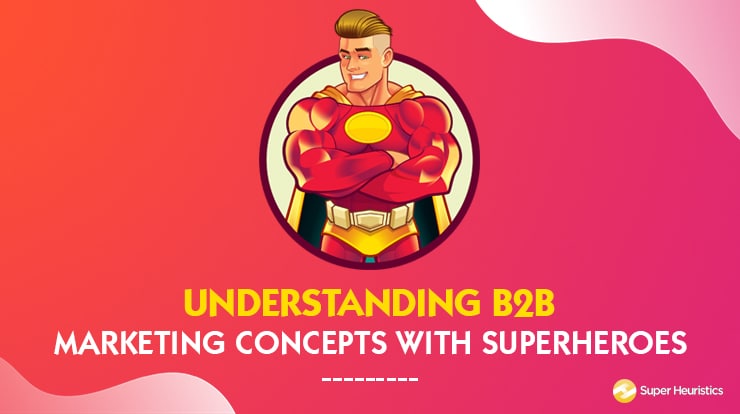
As students of marketing, we will always find a great deal of joy in studying about well-known marketing campaigns, famous consumer promotions, and nostalgic advertisements. These things have a sense of glamour, fun, and creativity attached to them. But there is a specific discipline within marketing which is unique in its own right, and arguably as important. It is known as business-to-business, or B2B marketing.
B2B Marketing involves two or more businesses that are in the early stages of a value chain, at the end of which is the mass customer. Invariably, B2B marketing is also stimulated by consumer demand, just like B2C marketing. But in a B2B chain, we consider the consumer as the business which buys raw materials or machinery from the producer/manufacturer, and in turn makes the finished goods.
So let's get on to understand how unique is B2B marketing. Let me take you through some nuances of B2B marketing that are somewhat unlike B2C marketing. Once you get a preliminary understanding of these B2B marketing concepts like the B2B Value Chain, B2B Marketing Decision Makers and B2B vs B2C, you will get in a comfortable position to evaluate any new marketing strategy from not just the B2C perspective but also from the B2B angle.
B2B Value Chain
A B2B value chain is usually longer than a B2C value chain. Let’s take the example of t-shirts.

In order to manufacture them, a cotton producer sends cotton to a spinning yarn, which in turn produces threads and gives it to a shirt manufacturing company where the weaving department sews them. The sewed shirts are then loaded into cargos by logistic companies and delivered to retail stores. Each player in the chain adds some value to the goods before passing it on to the next, and it is therefore known as a value chain.
The deal between the cotton manufacturer and the yarn producer, or the yarn producer and the shirt manufacturing company etc. are all Business-2-Business deals.
B2B vs B2C
A B2B marketing process is much longer as compared to a B2C process. B2B deals are driven by utility, quality standards, after-sales service, and rational decision making. On the other hand, B2C marketing is much more advertising oriented, and the decision making is often emotional rather than logical.
In fact, advertisers and brands often trick you into believing that you are taking a very logical and sound decision.
The fact, however, is that you are often shown discounted prices and special deals that make it appear that you are saving a lot of money or getting something extra for the cost of one.
The fact is these consumer promotion deals don’t work in B2B markets, because in B2B marketing, you ought to have quality products. Also, there are a lot of parties involved in decision making.
Decision making in B2B Scenario
As you can see, there may be at least these many or even more parties involved in a B2B buying scenario.
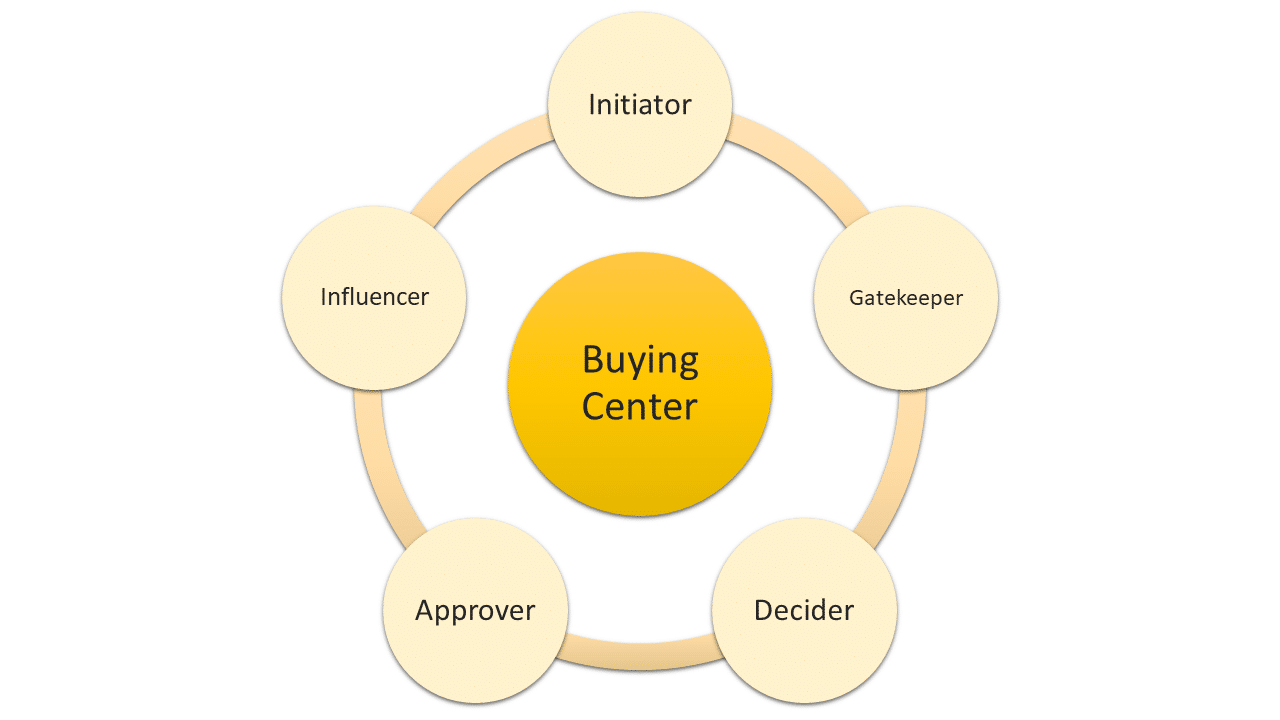
How do you really identify who is playing what role in your B2B journey? Here are the different decision making roles in B2B selling.
- Suppose you are XYZ Corporation, a chip manufacturer for telephones, and you contact Samsung. The concerned person who takes your calls or emails is the Gatekeeper. He will take information from you and pass it on to the people in the procurement department.
- The procurement department might have been told by the Product team that they are looking for specific types of chips and need them to manufacture the next batch of cordless phones. The product team becomes the Initiator.
- Someone at the senior position in the Product team might decide, after careful assessment of the proposal, whether the chip is of the designated quality or not. This person becomes the Decider.
- Now does the company have enough budgets to buy the chips? This call may be subject to the finance team, and therefore they might be the Approvers in a lot of cases.
- Last but not the least, consider your CTO as the person who was previously working with another telecom company and had purchased chips from XYZ Corporation for their phones. He might tell you to go ahead with this company over another one that had sent you the proposal. He may be the Influencer in this case.
Do you realize how long a B2B deal can take to get completed? The B2B decision making often takes months. On the other hand, in a B2C deal like buying a cold drink, you don’t even think for a moment. This is also because many B2C purchases may not deserve that kind of logical thinking.
Core B2B Concepts
Let me take you through the core B2B marketing concepts with some interesting examples that will help you understand how B2B marketing is unique.
1. B2B is all about Rational Decision Making – Just like Batman
Consider a Nike shoe – everything right from procuring the raw material to getting the shoes made may cost Nike just $50. But because the brand is so famous, they put their famous swoosh, and the value of the pair automatically becomes $200 when it is in their showroom.
Customers from around the world, including you and me, pay exorbitant sums of money to buy a pair of Nike, or a Prada bag, or even an Armani watch. In spite of knowing that it is marked up by perhaps 1000%, people still buy it.
A B2B buyer would never pay such sums of money. In fact, they are not even worried about the brand name.
B2B buyers indulge in rational decision making.
B2B buyers are the Batman of the marketing world. Batman doesn’t have any superpowers, and therefore he totally relies on critical thinking, and logical reasoning.
A B2B buyer seeks value and utility from a product and pays only as much amount as the product deserves. It may be anything – a machinery, raw material etc.
2. B2B Marketing is Relationship Driven – Just like Captain America
B2B Marketing has got a lot to do with relationship building. Since the products involved are so complicated, a company cannot simply sell a product to another company and then fade out of the scene.
The seller has to tend to the clients, assist them, share knowledge about the workings of the product they’re selling, and thus develop meaningful relationships with them.
To be a market leader, a company needs to go the Captain America way.
Captain America finds a way to build a unique relationship with each of his teammates – be it Thor, Iron Man, or anyone. This is what makes him a leader.
To be a market leader, a company needs to go the Captain America way.
3. B2B Marketing is about Credibility – Just like Superman
A B2B deal requires credibility at both ends – the buyer and the seller. Since B2B Marketing is about long-term commitments and relationship building, the products being offered should always be credible, and never faulty.
On the other hand, the buyer’s purchase team should only purchase once they’ve verified the credibility of the seller. This is because a single purchase of a critical machinery or raw material can have a lasting impact on the company’s financial performance for that year. A sub-standard purchase can make or break the company.
Credibility is one of the major traits of Superman
He has a firm grip on right and wrong, and when he’s not in his superhero garb, he’s still serving the society by offering credible news as a reporter.
4. B2B Marketers win on Innovation and Technology – Just like Iron Man
Iron Man is perhaps every innovator’s inspiration.
In fact, Stark Industries is the perfect embodiment of what every B2B marketer wants to be – cutting edge technology and superior products.
In a space where decision making is totally dependent upon quality and technology, B2B Marketers spend a lot of money on R&D in order to make their products better and more valuable to the buyers. If you offer products with superior technology that can make workflow easier, the buyer is willing to pay even a little extra, provided you show that value added.
5. B2B Marketers strive to deliver superior Service – Just like Spiderman
B2B products are often heavy pieces of machinery and other industrial products that require a great deal of service. Take the example of an elevator company, that provides elevators to a housing complex. This is a B2B deal, wherein the elevator company’s job is not just over at selling the lifts. They have to provide service whenever a problem arises.
Spiderman believes in serving others at all times. In fact, when he needs help from the crane operators, they help him because Spiderman had earlier helped the crane foreman’s son.
Good deeds come around. Similarly, good service helps you win renewal contracts.
You sure would have a better understanding of B2B marketing concepts if you look at them the correct way. Do you have more analogies of how B2B or B2C concepts can be linked to your favorite superheroes?
Comment and let me know!


